Coronavirus: Motorbike accident spike fear on Welsh roads
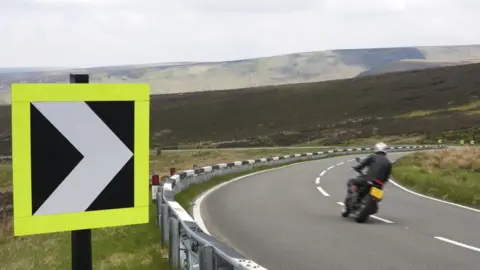 Getty Images
Getty ImagesMore motorcyclists could be seriously injured on Welsh roads as people avoid public transport, experts have warned.
Last year 247 bikers were seriously injured or killed in Wales.
Police said nearly 50,000 motorbikes had been counted on roads in one weekend in lockdown.
The Royal Society for the Prevention of Accidents (RoSPA) said greater awareness was needed from all road users in order to cut deaths.
RoSPA safety officer Michelle Harrington said Wales' "spectacular" scenery meant people in England were increasingly coming across the border to ride.
"Given the reluctance to use public transport we could see even more motorcyclists on our roads," she said.
"Motorcyclists tend to come off the worst, what would normally be a small bump for someone in a car would cause serious injury.
"It is a tragedy for everyone affected, but often people do not think about it until they are involved in a crash or someone they love has been hurt."
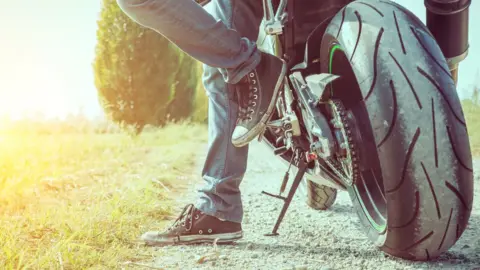 Getty Images
Getty ImagesDuring the first few months of lockdown, police accused some motorists of using quieter roads as "racing tracks", with data revealing more accidents happened in fine weather.
Police figures, from road safety campaign Operation Darwen, show a "significant increase" in bikers using Welsh roads after travel restrictions were eased.
Ch Insp Tom Sharville, from Dyfed-Powys Police, said on Saturday 11 June, 22,000 bikers were counted on roads, rising to nearly 27,000 on the Sunday.
This is compared to about 4,500 bikes on an average weekday, he said.
"The number of collisions involving bikes during the first weekend saw a demand on resources that had not been there in previous weekends during lockdown," he said.
Police across Wales are now using technology to try and stop crashes, using live sensors under trunk roads to record hot spots to get officers on the scene quickly.
Ch Ins Sharville said: "It's not about targeting bikers, or trying to catch them out - rather it focuses on ensuring the safety of riders in Wales."
Latest statistics show that of the 5,789 people hurt in accidents on Welsh roads in 2019, 595 (10.27%) were motorcyclists.
Of these, 22 bikers were killed. Half of these fatal accidents happened in the Dyfed-Powys Police area.
In 2013, the Welsh Government set a target to reduce the number of bikers killed or seriously hurt in accidents by 25% by 2020.
But numbers, when compared with data from 2004-08, have only fallen by 3.9%.
Ms Harrington said biker numbers had increased in recent years, making the target harder to reach, and numbers were expected to be higher as people avoided public transport due to coronavirus.
'A reckless few'
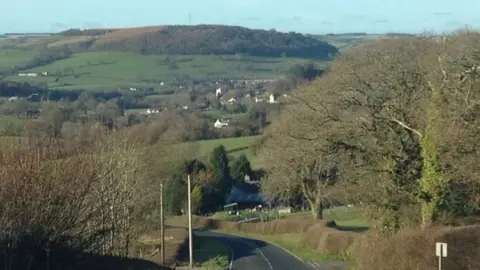 Anita Denny
Anita DennySouth Wales Advanced Motorcycle Group said its members had been "appalled" by the reckless behaviour during lockdown of a small number of bikers who were giving responsible riders a "bad name".
"There are a lot of really well behaved motorcyclists, but they are almost invisible to the general public," said chairman Dave Hutton.
"A lot of members of our group have volunteered as blood bike riders during lockdown, helping to save lives across the UK, and many have been acting as local community champions, helping deliver shopping and prescriptions to people who are isolating."
Mr Hutton said motorcyclists were very difficult to spot and very easy for drivers to miss when turning or pulling out at a junction, making them very vulnerable.
"There was a time when you would expect to see several police vehicles on a stretch of road, but now you can go on a long journey and not see any at all," he said.
"Welsh roads are some of the best in the UK. There's a very large shared border, the roads here are very bendy and very fast, which some motorcyclists like."
Mr Hutton said motorbike companies were using fears over public transport to boost sales during lockdown, though bikes were a great alternative for easing congestion in cities.
However, he added, issues tended to be with younger riders and "born again bikers", who go back on the roads without new training.
"You can enjoy the thrills and still stay perfectly within the law, and if you do anything that is not within the law you will not pass," he said.
'How many more have to die?'
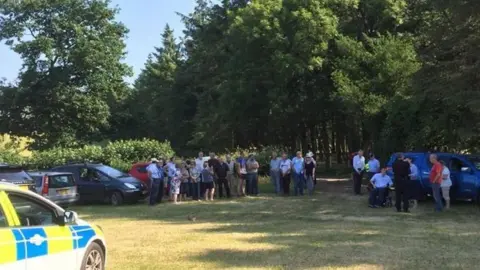 Anita Denny
Anita DennyFor years, residents living near the 60mph A4215 between Libanus and Defynnog, in Powys, have been campaigning for safety measures on the road after a number of fatalities.
"When someone pulls out, no-one can see properly and it can mean game over," said resident Anita Denny.
She said people were now scared to leave their homes as more people travelled to the area in the summer and during lockdown, with near misses and crashes.
Ms Denny said that while the majority of road users were well behaved, going to the shops could mean driving head on into lorries, motorbikes and cars.
In recent weeks, Dyfed-Powys Police said they had caught motorcyclists going 127 mph on the Brecon bypass near Pen y Fan, while all forces captured motorists speeding across Wales during lockdown.
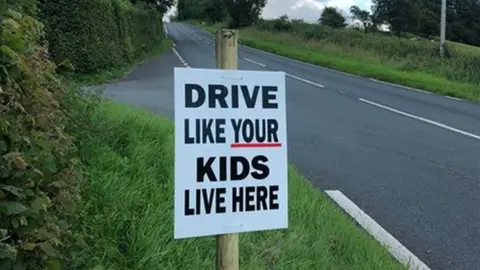 Anita Denny
Anita DennyFay Jones, MP for Brecon and Radnorshire, visited the road on 19 July.
"I am well aware that many bikers use the road responsibly, and I am very keen to ensure they keep enjoying the Brecon Beacons and all that we have to offer, but any vehicle speeding is unsafe, inconsiderate and needs to stop," she said.
Ms Jones said the Army had agreed to stop sending lorries down the road and Powys council had been supportive of improving safety measures, and was discussing measures with Dyfed-Powys Police.
She said she was arranging a meeting with Google Maps to discuss how to stop people being sent down the road by sat-navs.
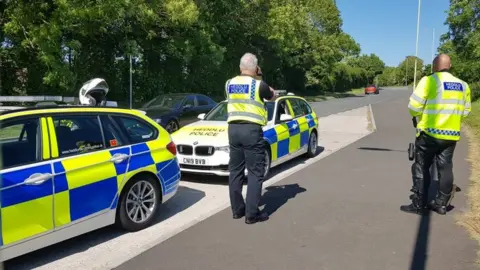 SWP
SWPWhile the number of fatal accidents has fallen steadily over recent years, last year there was a slight increase in the number of accidents on Welsh roads, with 2.5% more compared with 2018.
And while Gwent Police recorded the smallest number of accidents, it saw the biggest increase in collisions, from 632 to 715 - 32%.
The force said the rise could be down to a change in more accurate reporting systems, and an increase in traffic on roads following the removal of the tolls on the Prince of Wales bridge and the M48 Severn Bridge.
'Training and prevention needed'
Ms Harrington said many dangerous roads in Wales had been "designed out" and most accidents were down to human error, such as drivers not seeing bikers.
She said that, as biker numbers increased, greater awareness was needed by all road users, but that it was proving hard to get motorcyclists to attend road safety courses put on to reduce accidents.
"We find there is a reluctance, sometimes local authorities do not fill the spaces, possibly because motorcyclists think 'I've been driving for 20 years, what can they teach me?'," she said.
Road safety partnership, Go Safe, said motorcyclists were "specifically vulnerable" and the police had engaged with bikers to increase safety through Operation Darwen.
The Welsh Government said it took road safety "extremely seriously" and every death was "one too many".
"We continue to work with our partners to achieve the targets set out in the Road Safety Framework for Wales and ensure roads are safe for all users," a spokesman said.
